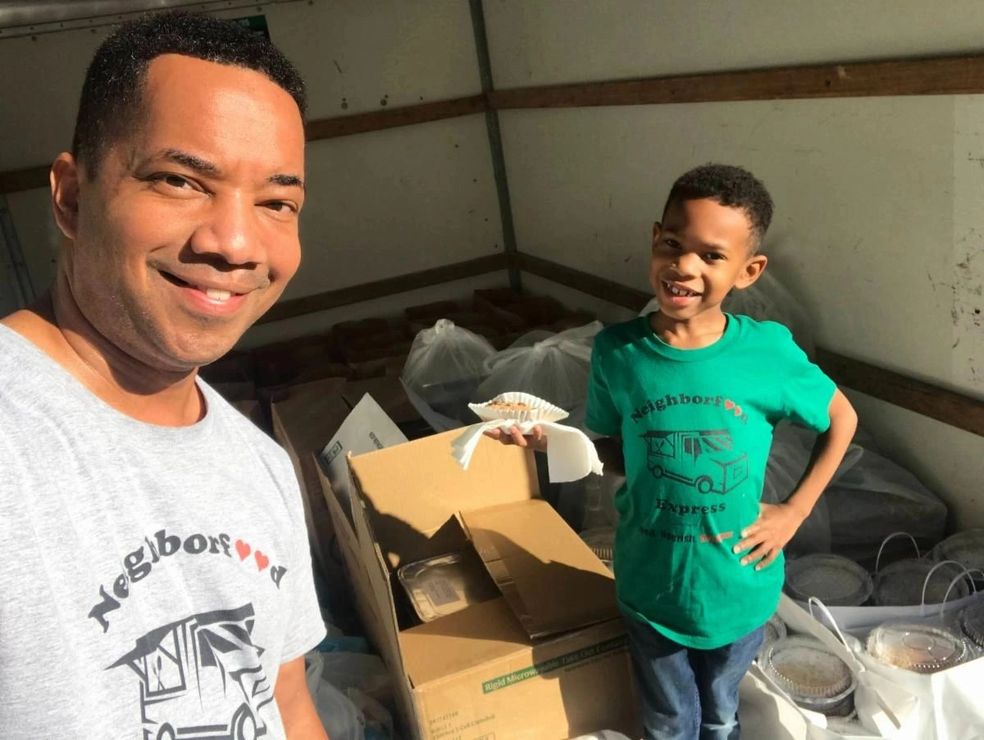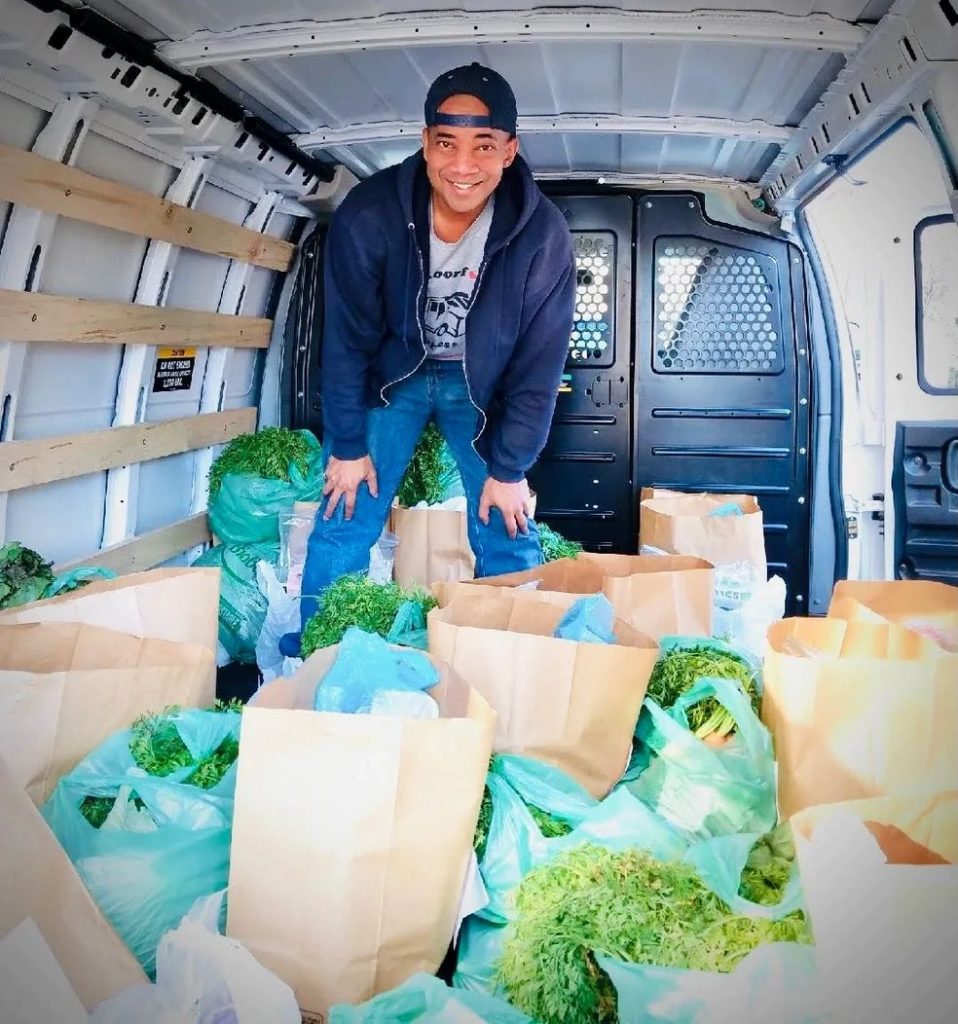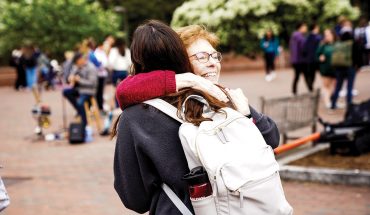The Marcus Harris Foundation is using home delivery to bring food and supplies to families in need.
by Kayla Guilliams
For some, the pandemic has brought a lull in work and business. For others, like Marcus Harris, it has made their work even more urgent.
Harris is the founder of The Marcus Harris Foundation, a Triangle area-based charitable non-profit that helps underserved communities in the areas of education, housing, access to food, and more. When the pandemic hit in March, the foundation noticed that an issue that has been present in the community for decades — food insecurity — started to get worse. “So during all the food insecurity problems the pandemic caused and is continuing to cause, we started Neighborfood Express,” Harris said.
Neighborfood Express is a food truck delivery service that delivers free hot meals, groceries, and essential supplies to six low-income and food-insecure neighborhoods in Southeast Raleigh. Harris said they were originally planning to have centralized distribution sites for people to come and get food, but quickly realized that there was a need to do home deliveries because of the pandemic.
“A lot of folks we serve lack personal transportation or a lot of them are homebound seniors and can’t get out of their homes,” Harris said. “So we’re actually doing better now than if we had done it our original way because we can help people directly where they are.”
Throughout high school and college, Harris, originally from Durham, planned to study medicine – he got his bachelor’s degree in pre-med chemistry from Pfeiffer University. But he had always loved directly helping his community, and as he spent more time volunteering at local organizations, getting involved in community-based work and activism, and serving as a mentor for kids, he wanted to make it his life’s work. So in 2018, after a friend suggested he start a non-profit, he decided to start The Marcus Harris Foundation to help amplify his efforts in the community.
The foundation runs several different programs to help meet the unique needs of the community. They fund teachers’ classroom needs through Project ClassAct, provide free haircuts to kids from underserved families through Kutz for Kids, award scholarships to young scholar-activists through the Robert B. Harris Scholarship Program, and deliver Christmas presents to children fleeing abusive homes through their Christmas Smiles Drive. “I have experience as a domestic violence survivor,” Harris said. “So that program is a big deal to me.”
Harris is also an award-winning poet, author, playwright, and filmmaker, and incorporates his passion for community activism into his works. In his 2006 debut collection of poetry, In Search Of A Voice, he touches on topics like police brutality, domestic violence, child abuse, and the divisive racial legacy of America. His work as a poet has led him to also become an advocate for arts education, presenting poetry workshops at different elementary, middle, and high schools and giving guest lectures on literature at different colleges.
Brandon Bibler, a student at the University of Colorado, joined the foundation’s staff earlier this year as a marketing intern. He said he was drawn to the organization because of all the programs they run, like Neighborfood Express, that aim to directly help the community. “I’m just a college student, so I can’t donate a lot of money to organizations like this,” he said. “I can’t do much but give my time, but hopefully getting the word out will lead more people to know about the organization so they can help Marcus help the community. Being able to be a part of that is incredible.”
The foundation officially launched Neighborfood Express on November 21, 2020, and so far has served over 3,400 individuals and distributed nearly 16,000 pounds of free food. The program has a goal of distributing a minimum of 50,000 pounds of free healthy groceries and essential supplies within its first year, but Harris says the goal of the program isn’t just to deliver food to the community: it’s also to address the problem of food insecurity in an innovative way.
“Lots of folks are taking out food and delivering food to people, there’s nothing unique about that,” Harris said. “But we also connect the people we serve with partner agencies to help them with employment and housing so we can get at the root causes of food insecurity.”
The program has referred over 200 individuals to support services like employment training, addiction recovery, mental health counseling, and more. Harris said they have done this by creating a Community Empowerment Coalition that is made up of local organizations like Southeast Raleigh Promise, Healing Transitions, Wake County Smart Start, and Dress for Success, as well as the Wake County Government.
Families in the program also receive free books thanks to the foundation’s partnership with WAKE Up and Read, a community coalition that works to improve childhood literacy. Beth Rossen, administrative specialist with WAKE Up and Read, said partnering with the foundation has allowed them to get books to families they may have not been able to reach otherwise. Nearly 300 bags of books have been distributed to children since the program began in November.
“One of the challenges during the pandemic has been our limited access to families, because we can’t have them coming into our building,” Rossen said. “And working with partners like the Marcus Harris Foundation that have a direct tie to families means that we know that the books are getting directly into homes in our target areas.”
While the program has been a huge success, Harris said the foundation has some of its biggest projects yet currently in the works. “We’re eventually going to evolve Neighborfood Express into a free grocery store,” he said. The foundation also plans to address affordable housing in Wake County by starting a community land trust, so community members can buy homes without having to pay for the land.
Through all of their programs, the foundation is moving towards the same goal: working themselves into irrelevance. “If we can help the community to the point where they don’t need us anymore, then we’ve done our job,” he said. “So that’s our goal.”




